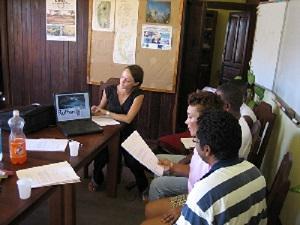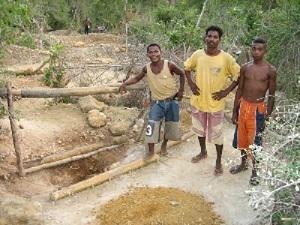Merrill Baker
I am studying the current and potential role of ecotourism in two sites in Madagascar where also a thriving gold and sapphire mining industry exists.

Presentation.
Madagascar has, within the last two decades, been internationally recognized as a conservation priority because of the islands high rate biodiversity coupled with the ever increasing rate of environmental degradation. Livelihoods that provide an alternative to environmental destruction are needed. Ecotourism may be one type of employment that provides this alternative. I am studying the current and potential role of ecotourism in two sites in Madagascar where also a thriving gold and sapphire mining industry exists. Mining efforts in these areas currently invade the boundaries of two nationally protected areas: Darina and Ankarana Special Reserves. These reserves protect hundreds of plant and animal species endemic to Madagascar.

Mining team.
This study is looking at how locals involved in the lucrative mining industry understand and respond to the international and national conservation efforts in the two areas and how/if ecotourism can provide an alternative livelihood for locals involved in gold and sapphire mining. I am predominately using interviews and on-site observations to asses the potential for integrating tourism into the lives and livelihoods of the communities at these target sites. I am helping a few of these communities start activities that provide an alternative to environmental destruction while capitalizing on the presence of the growing ecotourism industry in their region. Jobs that we are exploring include guiding tourists to see the inner works of Madagascar’s artisanal gemstone mining, selling handicrafts locally or potentially internationally, and building community ran bungalows or campsites for tourists.
Gemstone mining and ecotourism are two topics that are understudied in this area of the world. The results of this study are expected to shed light on possible ways to improve the mechanism by which tourism is integrated into Madagascar's development, specifically for populations involved in highly environmentally destructive activities such as mining. Additionally, the results of this study will provide information to governmental and non-governmental organizations working in the area and will hopefully influence future decisions and policies to best serve nature conservation and ecotourism development in rural communities.